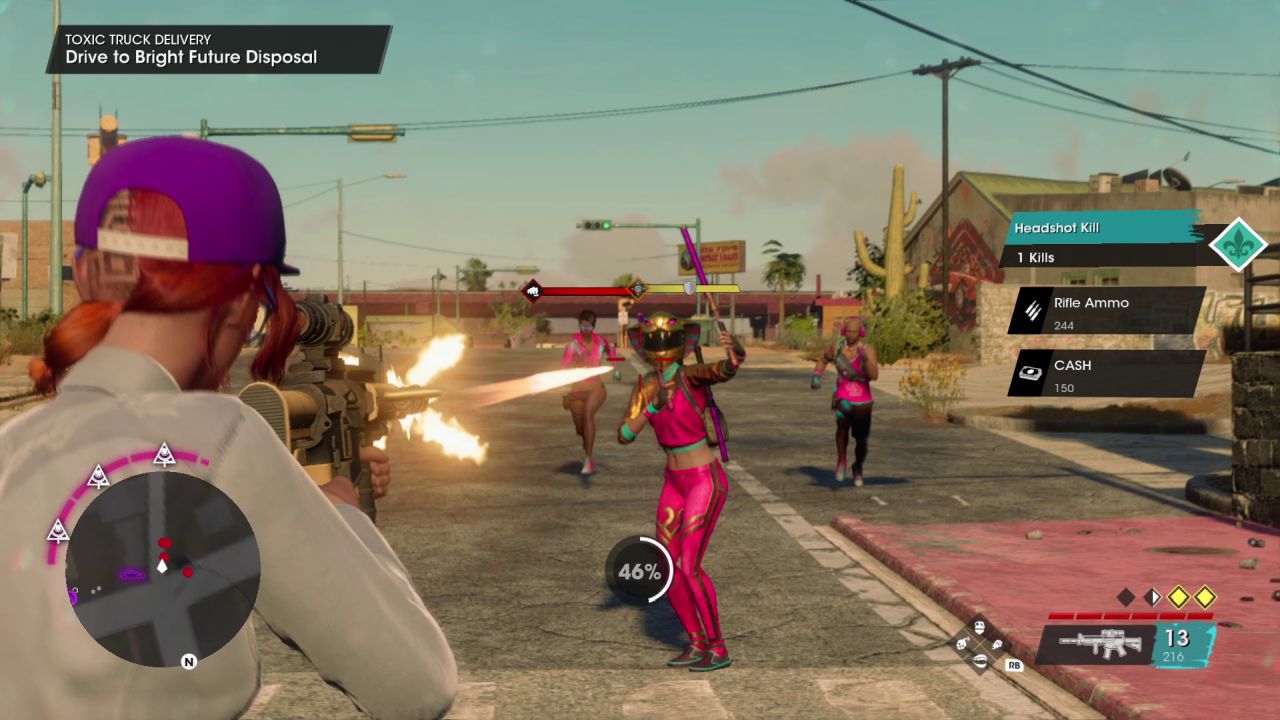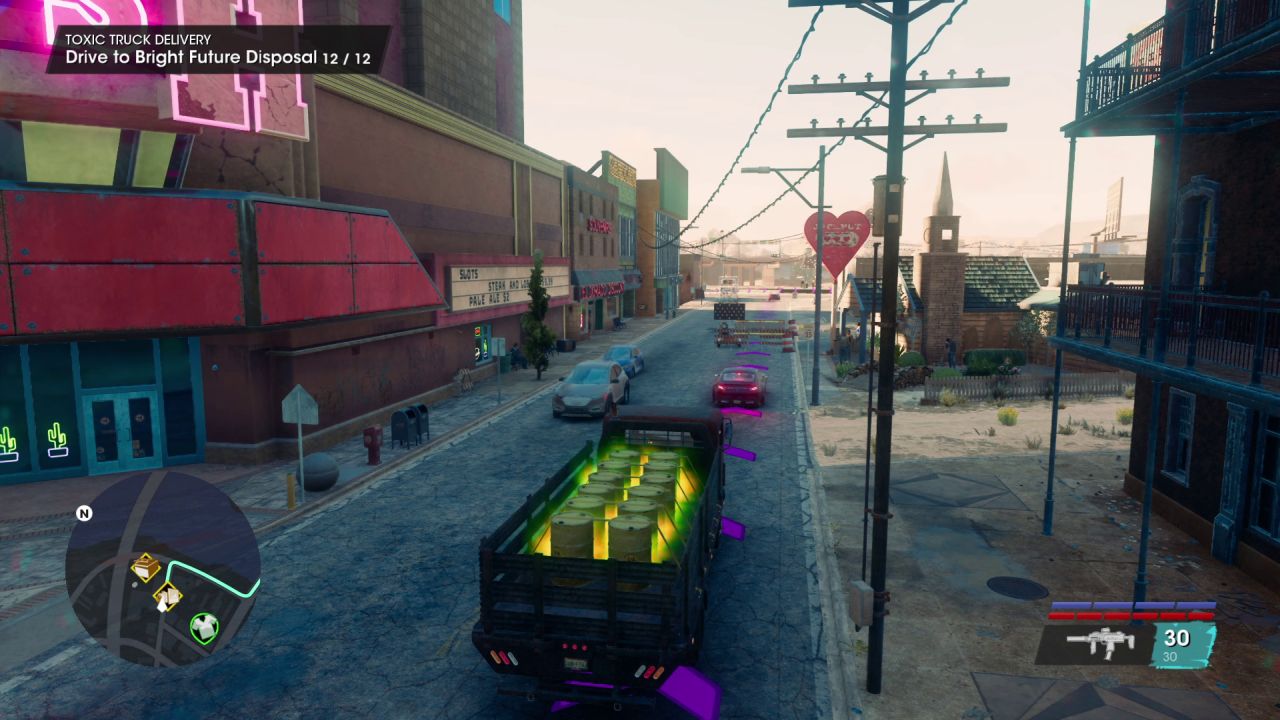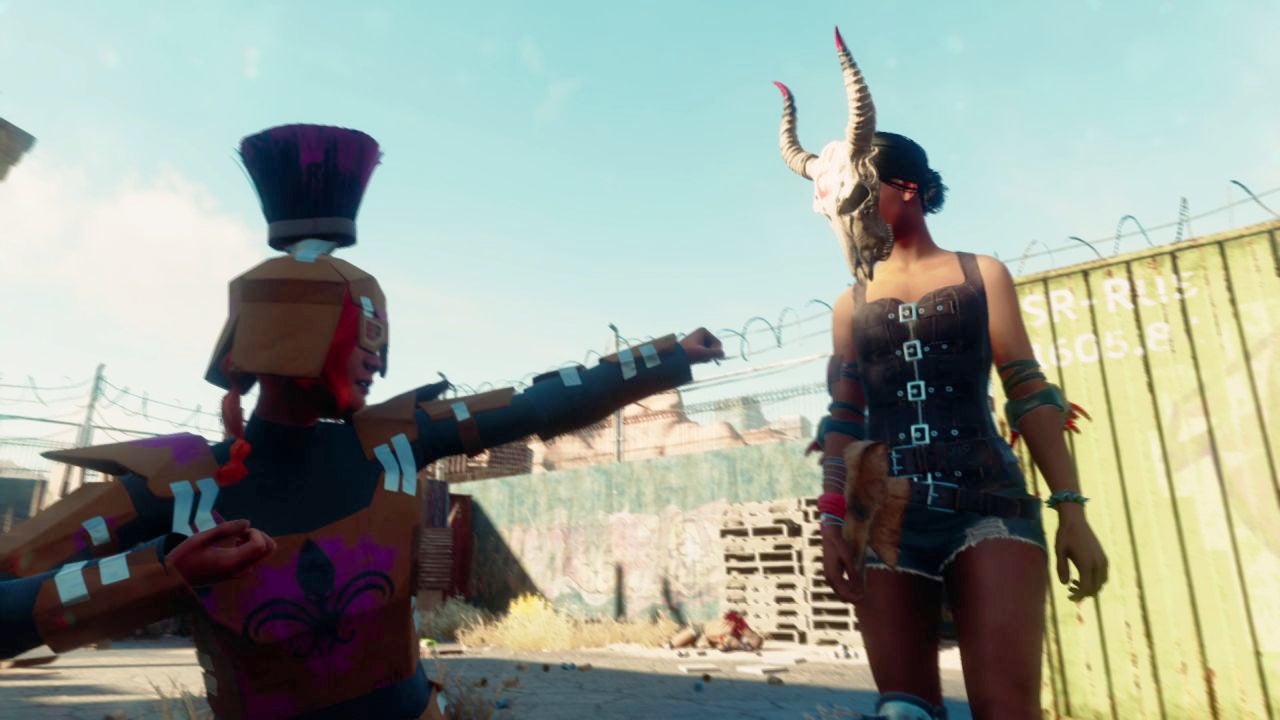Saints Row (2022 edition) is back to being a sort of Saints Row again, but also still trying to appeal to people who loved the characters and dick jokes and cartoon carnage of the Saints Row of 2013. If I was being reductive, I’d say it’s Saints Row by way of Watch Dogs 2. It isn’t bad. It’s fun, in fact, but it isn’t really doing anything new, either, and I think that’s a shame. I mean that thematically because there are a lot of technically literally new things. Your story is similar to the original Saints Row, but this time you’re actually founding the Saints. The A-plot story is where, over a surprisingly short 10-ish hours, you grow to take down the other three gangs in the city. These gangs and your own lieutenants are all new; you, Kevin and Neenah all worked for one of said gangs and became dissatisfied, while your fourth roommate, Eli, is an MBA who becomes your numbers and logistics guy. The B-plot is the map clearance, and that will take up far more of your time. While taking out rivals is all well and good, you have to cement your own gang’s power by taking over the different districts of the city, with all the busy work and criminal sidequests that entails. The city itself is my favourite thing, and it’s the part of Saints Row that feels the most fresh and different as a whole. Santo Ileso is a fictional mashup of the South West United States, a bafflingly huge tract of land that includes a bunch of similarly unthinkably huge states. While Saints Row 3 and 4 took place in the distinctly grey Steelport, Santo Ileso is awash with colour. It has a neon-lit strip that feels like a chunk of Las Vegas, a kind of historic old town that has an Alamo Mission-esque heritage site, and a high-tech business centre that smacks a bit of California. The surroundings are like the famous orange deserts of Arizona and Utah. If you walk around Santol Ileso you can come across some really nice little pedestrianised areas and beauty spots, weird sculptures and what are clearly local food spots or dive bars. These are easy to miss because you spend most of your time blazing across the place at breakneck speed in whichever car you most recently stole. It’s pretty impressive how different all the vehicles feel, and you’ll develop favourites - but in almost all cases convenience takes precedent and you boost whatever set of wheels are nearest. Similarly, the shooting is pretty slick, although I never found any particularly wacky weapons, even when I went looking for them for this review. The fun things are the special abilities to trigger in combat, like healing or dropping a smoke grenade. It all pulls together as a fun, but mostly frictionless experience. I wouldn’t say the game, on its suggested difficulty setting, is at all hard. But hey, you’re a career criminal, so whattaya going to do? Not steal cars? Not shoot stuff and lay waste to the place? So off you go, to seize your own particular American dream, in whatever wacky food-shaped hat you just bought (I did a lot of crime dressed as a taco). But the more you play, the more you notice a tension in Saints Row. It’s both wanting to reinvent the Saints Row open world, but scared of moving too far from the template, and the result is, you know, fine rather than great. It’s not impossible to have heart at the same time as being wacky and larger than life, but in Saints Row both sides of the equation feel like they were balanced by a board of execs working from a checklist of stuff they know people like. For example, during the game’s promotion everyone was at pains to point out that insurance fraud was still in the game, and it is. It’s one of several criminal ventures you build that bring in revenue by doing illegal stuff: build a shady doctor, do insurance fraud. Build a shady waste disposal, race across town with toxic waste. Build a shady food truck business, steal rival food trucks. But insurance fraud is only one of like a dozen of these, many of which are their own cool thing. Your laundromat is a front for crime scene cleaning! That’s funny! So you get the sense that the only reason insurance fraud is in this game is because someone at the top of the ladder added “Must have insurance fraud” to the checklist, because some demographic percentage point convinced him it must be there. The story has some really entertaining set pieces - my favourite involves blowing up an entire train and a yoink moment in a prospective boss fight - but every fourth one has a hip hop track kicking in exactly where you’d expect, trying to recapture that Saints Row: The Third Power moment. There’s a Professor Genki-like death match island. Even your mates have that kind of checklist feeling: one of them is nerdy. One of them is a Strong Female Character. One of them should make reference to being bisexual a lot, ‘cos it’s 2022. It’s like everything is designed to make a focus group think it’s cool, but you don’t make cool stuff if you’re consciously trying to be cool. You can tell that someone wanted to give as much love to the main story as the open world got, but it’s too short, so the pacing is off. Kevin and Neenah’s early character missions both drop their tragic backstory plot beat at almost exactly the same moment. In Saints Row, your player character may have known the other gang members for years, but you haven’t. You’ve known them a couple of hours, but there isn’t enough time to let you get to know them, so the game tries to speedrun the sympathy. When Kevin suddenly drops that the reason you just stole thousands of fast food Happy Meal toys is because he never got one when he was in foster care, it feels trite. He then pivots back into joking about not wearing a shirt, because that’s his thing. Eli became my favourite because he’s a cool nerd and at no point did he say “I like organising our business because I was bullied at school.” Eli’s whole sidequest thread is a legally distinct Mad Max LARP, and it works because you get to know him over several missions, rather than getting to know his character motivation. There are a bunch of things like this in Saints Row that I really enjoy, and usually it’s when stuff feels like someone really wanted to make it. During one mission with Kevin he pronounces AF as “ay-eff” and the Boss calls him out because that’s stupid and nobody does it in real life. Your combat abilities vary to the outlandish, with my favourite being stuffing a grenade down an enemy’s throat and throwing them at their mates like a bigger, more labour-intensive grenade. The world is full of excellent puns and excellent visual design to support those puns (most obviously in the aforementioned food trucks). Everything around these bits is good fun to play through - although slightly janky in parts, most annoyingly in the enemy AI pathing sometimes getting stuck (and for some reason there was often a kind of blurry effect on edges, like everything had peach fuzz, which I couldn’t find a way to remove). But when you’re in it, it’s easy to find that it’s 1am and you’ve been playing Saints Row for 8 hours without pause. It’s just that most of it then slides noiselessly off your hippocampus, indistinguishable from a kind of ur-gaming experience. It’s not exactly Saints Row, but it’s not exactly its own thing either. It just is, and the lack of creative purpose makes me think it exists almost exclusively for balance sheet reasons, which isn’t a nice conclusion to come to. I wish we lived in a world where the people who made the pun food trucks and the big, weird city and conceived the interesting duality of the Idols gang (and their cool helmets) were given a large pot of money and several years to make whatever game they wanted, no strings attached, no legacy series hanging over them. But that’s not the world we live in.




